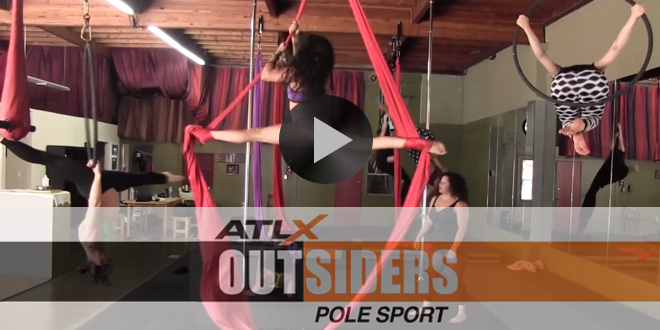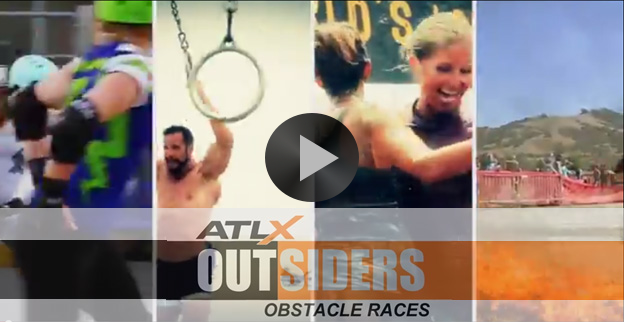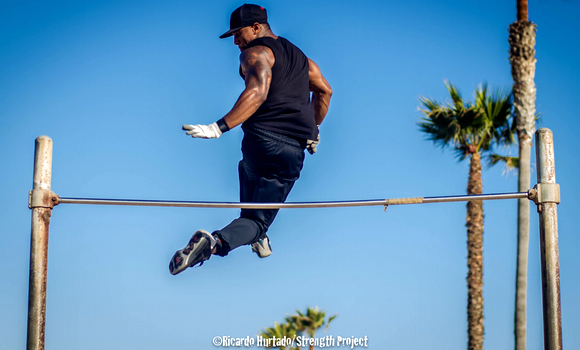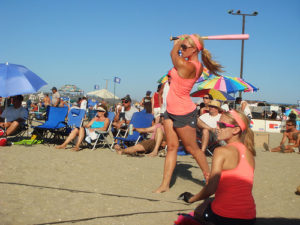 By: Sheri Matthews
By: Sheri Matthews
This weekend marks the second and final week of the famous Over-the-Line tournament that has been taking place in San Diego for sixty years. Founded in 1954, this sport, and specifically this tournament, doesn’t just bring friends and a community together … it brings some 50,000 spectators to the Southern California beaches. It might well be the biggest sporting event you’ve never heard of.
Over-the-Line, in essence, is a bat-and-ball sport in the family of baseball or softball. There’s a pitcher, hitter and fielders, with three players on each team. It’s played on the beach with a softball bat and a rubber ball. You pitch to your own team, though you’re not pitching in the traditional sense but rather tossing the ball from outside the playing field. The “field” is in the shape of a triangle and can be marked by pretty much anything, even seaweed, with two parallel boundaries, marked by ropes, extending indefinitely along the outside. Hit it out of the triangle – or, over the line — without it being caught, it’s a hit. Three hits equals a run. Don’t clear the Line or keep it within the parallel boundaries, it’s an out. Two outs to an inning. Game on …
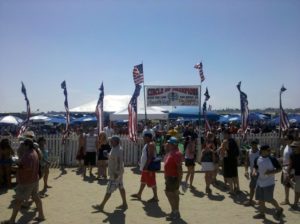 The rules, as you can tell, are pretty simple, and the scene can get pretty wild. Imagine beach chairs, ocean, crazy costumes, bathing suits, plenty of adult beverages, and 1,300 male and female teams that almost always have a clever team name. A few of the PG-rated ones include, “It’s Not Pretty Being Easy” and “Beauty is in the Eye of the Beer Holder.” The whole thing is loads of fun.
The rules, as you can tell, are pretty simple, and the scene can get pretty wild. Imagine beach chairs, ocean, crazy costumes, bathing suits, plenty of adult beverages, and 1,300 male and female teams that almost always have a clever team name. A few of the PG-rated ones include, “It’s Not Pretty Being Easy” and “Beauty is in the Eye of the Beer Holder.” The whole thing is loads of fun.
There is, however, one problem – or at least there almost was.
“The event, sacred to many San Diegans and South Mission Beach residents, almost didn’t occur in the same way it had in years past,” said Tom Smith, who is the OTL committee chairman and a 16-year member of Old Mission Beach Athletic Club (OMBAC), the governing organization that started and plans the OTL tournament year round. “San Diego has had a ban on alcohol in public places and beaches, but city leaders realize that this event is special. The original rules are still written on the same piece of paper.”
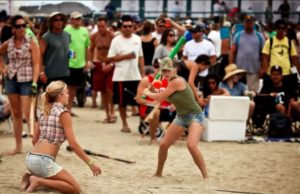 The rules include The No “B”s – meaning No Bottles, No Bicycles, No Babies, No Bad Attitudes and No Battles (fighting). Dogs are also not allowed.
The rules include The No “B”s – meaning No Bottles, No Bicycles, No Babies, No Bad Attitudes and No Battles (fighting). Dogs are also not allowed.
Last year the annual Over-the-Line tournament was the target of a lawsuit that nearly resulted in its cancellation, and the threat of litigation loomed over this year’s event as well. As a result, OMBAC had planned for a modified event this year with additional restrictions on alcohol sales. However, OMBAC is a respected group locally, and the tournament gives back to the San Diego community in many ways. OMBAC worked with city officials to show they could provide private security, and designated a committee specially assigned to oversee “alcohol management.”
In a press release from the City of San Diego 10 days prior to this year’s event, San Diego Mayor Kevin Faulconer said: “For the past six decades, Over The Line has become part of the fabric of San Diego. This announcement means thousands of San Diegans and visitors from across the world will be playing Over The Line on the sands of Fiesta Island just like they have since 1954.”
So the game, and party, goes on, with OMBAC holding its 61st annual tournament beginning last weekend, when an estimated 50,000 people were in attendance.
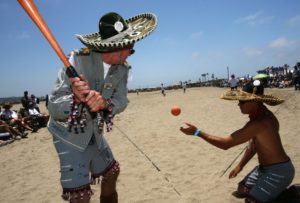 “The money raised from the recycling alone over the four days is enough to send the local boy scouts troops to summer camp,” said Smith, who added that in the past all recycling funds have been given to the local youth groups and Urban Corps, a group designed to provide activities for teens of lesser financial means to encourage them to stay in school.
“The money raised from the recycling alone over the four days is enough to send the local boy scouts troops to summer camp,” said Smith, who added that in the past all recycling funds have been given to the local youth groups and Urban Corps, a group designed to provide activities for teens of lesser financial means to encourage them to stay in school.
OMBAC meetings are held at the Beach Comber bar, just a feet from where the sport itself was created in the sand by its three founders. Again, much of the tournament is based on these traditions.
Winners of the tournament in all 10 divisions are competing for the coveted Championship Ring. Keith Esser, who has been playing Over-the-Line for over 40 years and has taken second in the big tournament twice, stated: “The key to being successful in any sport is athletic ability and the time the athlete puts into the sport. Over-the-Line is no different. Many of the top players were great athletes in others sports — whether it was baseball or softball or even a different sport such as racquetball, golf or basketball. I think it boils down to a basic individual competitive nature.”
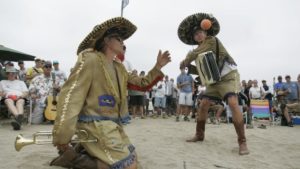 The great thing about OTL is anyone can play. It’s not uncommon to have what is known as a draw tournament — meaning players place their name in a hat and three names are drawn to form a team. This format is used with newer players. You can’t play a draw tournament with the expectation of winning against established, experienced teams. But it’s fun. That’s the point.
The great thing about OTL is anyone can play. It’s not uncommon to have what is known as a draw tournament — meaning players place their name in a hat and three names are drawn to form a team. This format is used with newer players. You can’t play a draw tournament with the expectation of winning against established, experienced teams. But it’s fun. That’s the point.
Who will take home rings at the 61st OTL World Championship will be determined this weekend, but we’re certain everyone’s going to have good memories to last another six decades.
 ATLX The only sports entertainment television and digital media network fully devoted to everyday athletes, athletic lifestyle and athletic culture.
ATLX The only sports entertainment television and digital media network fully devoted to everyday athletes, athletic lifestyle and athletic culture.

